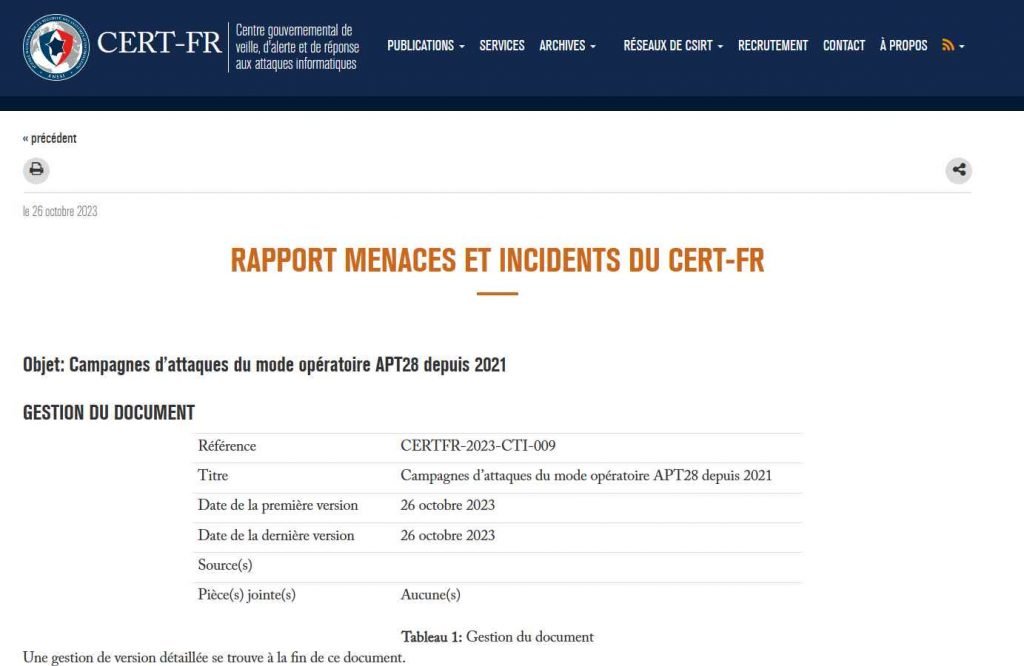According to a recent study published by the leading cybersecurity agency in France, a hacking organisation affiliated with Russia’s military intelligence agency has been spying on French colleges, corporations, think tanks, and government institutions. The research was published by the agency.
Since the second half of 2021, the group of hackers known as Fancy Bear or APT28 has been operating covertly into French computer networks in an effort to acquire a variety of sensitive sorts of data. According to the findings of the investigation conducted by the National Cybersecurity Agency of France, also known as ANSSI, the perpetrators of the attacks hacked systems that were not being actively watched, such as routers, and abstained from employing backdoors in order to avoid being discovered. These cyber attackers infiltrate peripheral devices on crucially important French organisational networks, according to a recent study published by France’s National Agency for the Security of Information Systems (ANSSI), and they do so without making use of backdoors in order to avoid detection. After conducting an analysis of the group’s Techniques, Tactics, and Procedures (TTPs), ANSSI came to the conclusion that APT28 infiltrates target networks via brute force and credential leaks in order to get access to accounts and Ubiquiti routers. In April of 2023, a phishing expedition was begun with the purpose of obtaining system settings, insights into operational operations, and other relevant data. Using the flaw identified as CVE-2023-23397, APT28 sent emails to Outlook users during the months of March 2022 and June 2023. In order to carry out reconnaissance and data collecting, the attackers made use of other vulnerabilities, such as CVE-2022-30190 (Follina) in Microsoft Windows Support Diagnostic Tool (MSDT) and CVE-2020-12641 in Roundcube webmail. Both of these vulnerabilities were exploited by the attackers.

In order to carry out their intrusions, the gang made use of applications such as the password harvester Mimikatz and the traffic relay tool reGeorg. Additionally, they made use of open-source services such as Mockbin and Mocky. It is important to understand that APT28 use a wide variety of different VPN clients.
As a cyber-espionage group, APT28’s primary mission is to gain unauthorised access and steal information from its targets. The hackers stole sensitive information from email accounts and stole authentication details by using common tools. The hackers also stole emails that were full of personal information. The Command and Control (C2) architecture is rooted on cloud services such as Google Drive and Microsoft OneDrive, which makes it more difficult to identify them.
ANSSI has mapped the TTPs (techniques, tactics, and procedures) of APT28 and found that the threat organisation breaches accounts and Ubiquiti routers on targeted networks by using brute-force attacks and leaked databases holding passwords.
In one incident that occurred in April 2023, the adversaries carried out a phishing effort that duped the receivers into executing PowerShell, which revealed their system settings, running processes, and other OS-related information.
APT28 is responsible for sending emails to Outlook users that attacked a zero-day vulnerability that is now known as CVE-2023-23397. These emails were sent between March 2022 and June 2023, which places the first exploitation a month earlier than what was previously revealed.
The ANSSI emphasises taking a comprehensive approach to security, which includes conducting risk assessments. In light of the dangers posed by APT28, there should be a special focus on ensuring the safety of email communications. The following is a list of the most important suggestions that the organisation has about the safety of email:
Protecting the privacy of email communications and preventing their disclosure via
adopting secure exchange systems as a means of preventing the diversion or acquisition of email traffic. Reducing the potential points of attack on email online interfaces and managing the dangers posed by servers such as Microsoft Exchange and putting in place mechanisms that can identify malicious emails.

Information security specialist, currently working as risk infrastructure specialist & investigator.
15 years of experience in risk and control process, security audit support, business continuity design and support, workgroup management and information security standards.











